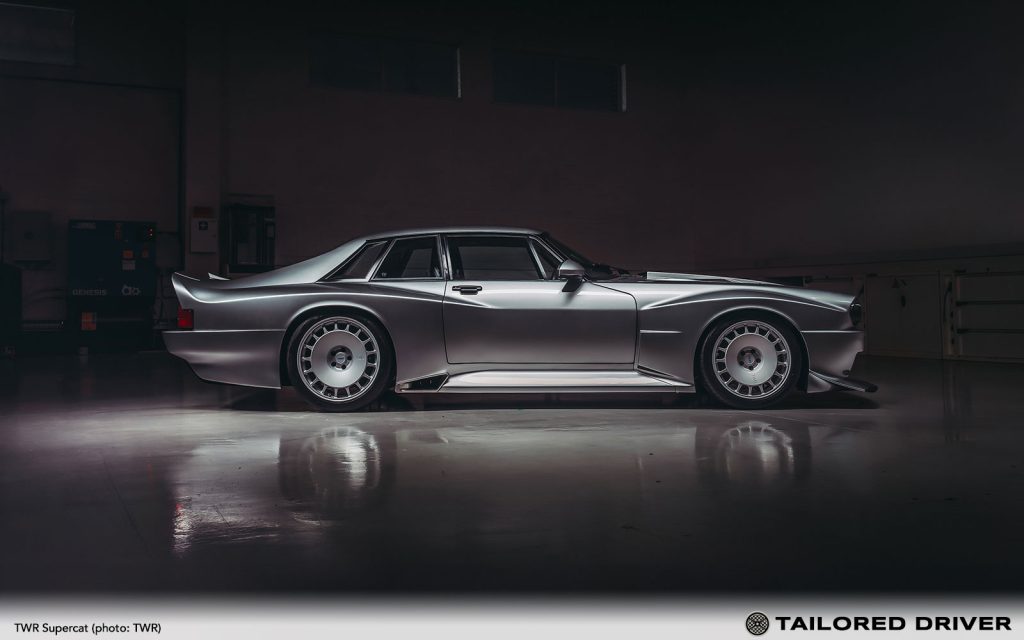
Global Debut for TWR’s V12 Super-GT ‘Supercat’
- New TWR Supercat breaks cover in public debut.
- Contemporary carbon-fibre body constructed on classic Jaguar XJS foundations.
- Supercharged V12 engine with confirmed output of 660bhp and 730Nm torque.
- Immersive and analogue driving experience from 6-speed manual gearbox and rear-wheel drive.
- Available to commission now, with numbers strictly limited to 88.
- Available in the UK and markets worldwide.
[source: TWR]
Newbury, UK
“Almost 40 years after my father’s original company dominated the racetrack, we’ve brought the TWR name roaring back with our new Supercat. Our debut product, designed as an authentic, analogue Super-GT for the committed driving enthusiast, has been developed for over three years by some of modern motorsport’s brightest talent. Built on the foundations of the classic Jaguar XJS, it uses modern materials and production methods, plus our in-house supercharged V12, to deliver a visceral, immersive driving experience on the road and the track. With production limited to just 88 examples and every car individually commissioned, it’s a chance to own something truly unique and personal, rooted in motorsport history but completely contemporary in its design, engineering and performance.”
Fergus Walkinshaw, Director and Founder, TWR
TWR has formally unveiled the Supercat, its radical new Super-GT underpinned by the legendary Jaguar XJS. Widely previewed in the summer of 2024, the Supercat has already earned acclaim from clients and commentators ahead of its public launch today.
The Supercat has been engineered by a team representing some of the most celebrated names in motorsport, including McLaren, Ferrari, Porsche, Williams, and Renault F1. The team is led by TWR director and co-founder Fergus Walkinshaw. His father, Tom Walkinshaw, the revered constructor and racer behind the original TWR, drove Jaguars to victory in the European Touring Car Championship, Spa 24 Hours, and Bathurst during the 1980s.
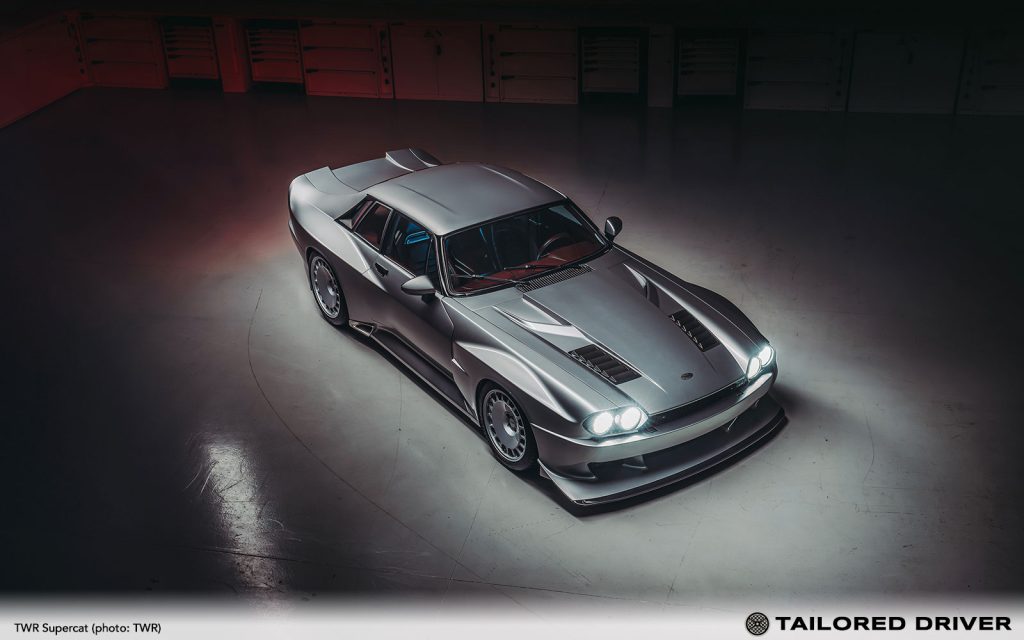
A True TWR Super-GT
The Jaguar XJS provides the essential foundation for the TWR Supercat, which also incorporates design elements inspired by other iconic racing Jaguars of the era, including the XJR-9, XJR-15, and the XJ220 supercar.
True to its motorsport heritage, the Supercat features rear-wheel drive and a six-speed manual gearbox, delivering an authentic, engaging, and entirely analogue driving experience. Beneath its long, sculpted, carbon-bodied bonnet lies a formidable supercharged V12 engine, developed in-house by TWR engineers. This power unit produces an impressive 660bhp and 730Nm of torque.
TWR’s philosophy emphasises that exceptional driving cars are not solely defined by raw power. This is demonstrated through a suite of engineering enhancements ensuring the Supercat excels dynamically in the world’s most demanding motorsport and road environments.
To manage the significant increase in power, the car’s structure has been reinforced with an integrated tubular steel framework, while lightweight carbon-fibre body panels contribute to a 9.3% reduction in weight compared to the original Jaguar XJS (1,605kg vs 1,770kg).
Additional features include the option for carbon ceramic disc brakes, fully programmable traction control, launch control, and five distinct driving modes. These modes enable drivers to tailor the car’s dynamics to suit various road and track conditions.
Double wishbone suspension, enhanced by an active dynamic damping system, ensures a composed and comfortable Super-GT driving experience on extended continental journeys. It also provides the precision, feedback, and stability required for dynamic road and track settings. This duality of character defines the Super-GT ethos, fulfilling the mission of creating a car capable of both high-speed touring and spirited track performance.
The Supercat excels at delivering on its mission. It is the perfect tool for driving to the Nürburgring, offering adjustable suspension and steering for a supreme GT driving experience on the journey there. Once on the track, the car adapts seamlessly to deliver exhilarating performance, before returning occupants home in supreme comfort.
Practicality has not been overlooked. The rear seats have been replaced with a significantly expanded luggage area, ensuring ample space for long-distance touring — a hallmark of the Super-GT DNA. Interior comfort is elevated with a completely overhauled cabin that integrates modern features while paying homage to the classic Jaguar XJS design.
This includes a fully digital multimedia interface (MMI) with Apple CarPlay and Android Auto compatibility. Suspension and steering settings can be easily adjusted via an intuitive toggle interface. Carbon fibre-backed leather seats are available in a contemporary design or a ‘heritage’ option, referencing the original XJS seat louvres.
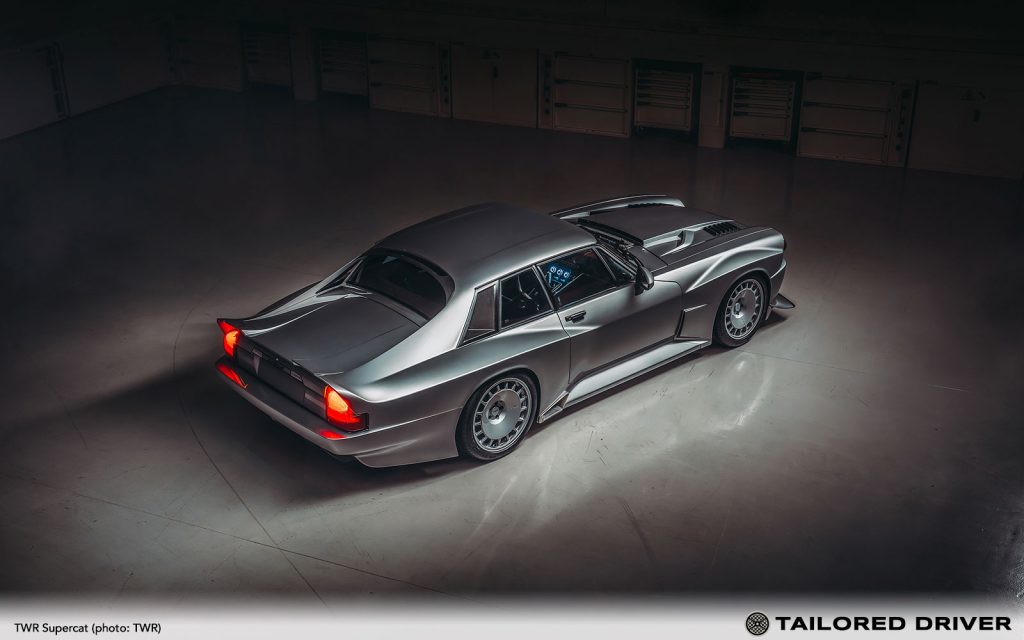
Radically Styled
“I am proud to have designed a TWR true to its racing and performance DNA, building on the foundations of one of Britain’s great automotive icons. The TWR Supercat represents an entirely new expression of the original. As a designer, working with a new palette of highly technical materials has allowed me to re-energise the form and stance of the Jaguar XJS, boldly expressing our mission to create a true Super-GT. Collaborating with TWR’s exceptional team of engineers and aerodynamicists, we’ve created a car where every line and feature serves a performance purpose, authentically representing TWR’s legacy on both the track and the road.”
— Khyzyl Saleem, Designer, TWR Supercat
The TWR Supercat brings to life a vision for a modern, high-performance TWR car built upon the classic Jaguar XJS. Its striking silhouette has been designed by Khyzyl Saleem, one of the world’s leading digital and 3D car concept stylists, renowned for his performance-focused projects with iconic names such as the late Ken Block and Travis Pastrana.
Saleem’s design efforts were further bolstered by the involvement of Magnus Walker, the legendary British-born designer and car collector. Walker’s expertise in global car culture was instrumental in refining the vision of creating a vehicle that blends the Jaguar XJS’ foundational legacy with the bold, distinctive aesthetics and substance of a contemporary TWR car.
Their combined efforts lend the Supercat a more aggressively muscular character while preserving the Jaguar XJS’ iconic profile, including its signature silhouette, flying buttresses, and front-end graphic. Subtle design cues pay homage to TWR’s decades-long relationship with the Jaguar marque.
In keeping with TWR’s guiding philosophy, the Supercat’s design is driven by engineering requirements to achieve exceptional performance. Saleem’s design proposals were rigorously evaluated for aerodynamic efficiency by a former World Championship-winning Mercedes-Benz F1 aerodynamicist. This collaboration ensures the Supercat delivers a visceral and engaging driving experience, fulfilling the original design brief.
The resulting design not only communicates the Super-GT’s dynamic intent but also incorporates a suite of aerodynamically functional features to generate critical downforce. These include precision-designed splitters and in-body aero enhancements that provide the stability demanded in both high-speed touring and track settings.
Key aerodynamic innovations include a complete reimagining of the XJS’ iconic flying buttresses, now reshaped to optimise airflow from the body to the rear haunches. The floorplan has been flattened and paired with a bespoke, fully re-engineered rear splitter to generate additional downforce necessary to manage the Supercat’s extraordinary power output. To accommodate these changes, the exhaust system has been repositioned from the rear to the side of the car.
The Supercat’s broader stance further reinforces its dynamic character. Its width has increased from 1,793mm to 1,975mm compared to the original XJS, enhancing its visual and aerodynamic profile. This wider footprint is complemented by TWR Forged Monoblok wheels, sized at 18 inches at the front and 19 inches at the rear — a significant evolution from the original XJS’ 15-inch alloys.
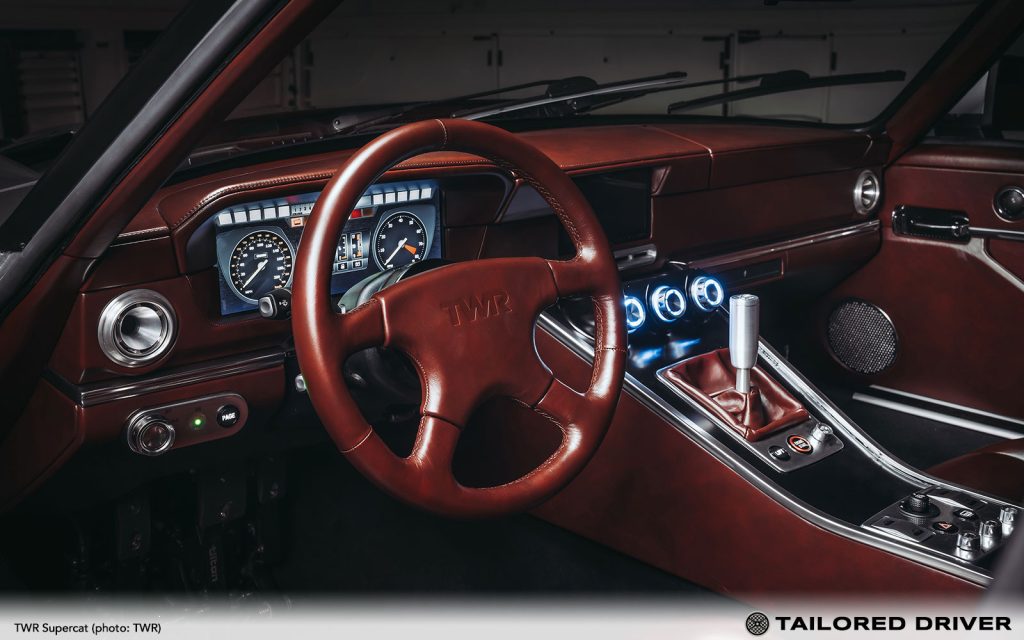
The First of a New Breed of TWRs
As the first TWR production car, the Supercat is the perfect exemplar of the company’s philosophy: blending modern engineering, materials, and methods with a classic base to create something that truly captures the spirit of TWR, which reshaped world motorsport in the 1980s and 1990s.
Future TWR models will undergo the same rigorous development and testing process, adopting protocols and facilities used by the world’s leading sports car brands, racing teams, and other performance specialists.
The same philosophy is applied to the manufacturing of every TWR product, with every car hand-built at the company’s facility in Newbury, Berkshire, at TWR’s dedicated factory.
The Magic Number
TWR is now accepting commissions for the Supercat, whose production run will be strictly confined to just 88 examples worldwide, in homage to Tom Walkinshaw’s famous win with the XJR-9 at Le Mans in 1988. The first customer deliveries are expected in the summer of 2025.
Every Supercat is built to order, and customers have a wide range of personalisation options. Orders have already been taken across the United States, the UK, Europe, Asia, and the Middle East in both right-hand-drive and left-hand-drive configurations.
Prices will vary according to individual specifications but start at £225,000, excluding local taxes. A limited number of build slots remain open, with a £35,000 deposit.




TECHNICAL SPECIFICATIONS
| Component | Subcomponent | Jaguar XJS V12 HE | TWR Supercat |
| Chassis | Steel Monocoque | Steel Monocoque + Steel and Carbon Fibre Reinforcement | |
| Subframe | Front | Stamped Sheet Metal | TWR Design, Tubular T45 Steel |
| Rear | Stamped Sheet Metal | TWR Design, Tubular T45 Steel | |
| Suspension | Front | Double Wishbone | TWR Design, Double Wishbone with Active Dynamics |
| Rear | Semi Trailing Arm | TWR Design, MultiLink with Active Dynamics | |
| Wheels | Front | 15″ Alloy | 18″ TWR Design Forged Monoblok |
| Rear | 15″ Alloy | 19″ TWR Design Forged Monoblok | |
| Tyres | Front | 215 / 70 R15 | 275 / 35 ZR18 |
| Rear | 215 / 70 R15 | 325 / 30 ZR19 | |
| Brakes | Front | Vented Steel Disc, 4-pot Caliper | Vented Steel, 6-pot Caliper, Carbon Ceramic Option |
| Rear | Inboard Solid Disc, 2-pot Caliper | Vented Steel, 4-pot Caliper, Carbon Ceramic Option | |
| ABS | Yes | 12 Level Programmable ABS | |
| Engine | Displacement | 5.3 litre | 5.6 litre |
| Induction | Naturally Aspirated | Supercharged | |
| Fuel Injection | Fuel Injected | Fuel Injected | |
| Bore & Stroke | 90mm x 70mm | 92mm x 70mm | |
| Drivetrain | Gearbox | 3 speed auto | 6 speed manual |
| Propshaft | Steel | Aluminium | |
| Differential | Open | Plated Limited Slip | |
| Bodywork | Sheet steel | Carbon Fibre | |
| Technical Data | BHP | 285bhp @ 5,500 rpm (max rpm 6,500rpm) | 660bhp @ 7,600 rpm (max rpm 7,750rpm) |
| Torque (Nm) | 431Nm @ 3,000rpm | 730Nm @ 5,350 rpm | |
| Weight | 1,770 kg | 1,605 kg | |
| Dimensions | Length (mm) | 4764 | 4766 |
| Width (mm) | 1793 | 1975 | |
| Height (mm) | 1261 | 1210 | |
| Track Width (mm) | Front 1,489mm / Rear 1,504mm | Front 1,604mm / Rear 1,604mm | |
| Wheelbase (mm) | 2591 | 2591 | |
| Seats | 2 + 2 Manual adjustments | 2x Fully Electric | |
| Additional | Traction Control | 5 Level Programmable | |
| Launch Control | Yes | ||
| Drive Modes | 5 Independent | ||
| Tyre Pressure Monitoring | Yes |
About TWR:
Established in 2020 by Tom Walkinshaw’s son, Fergus Walkinshaw, alongside his business partner John Kane, TWR aims to stretch the famous name into the modern automotive world. While a separate entity from the original Tom Walkinshaw Racing, the new company shares much of the DNA and spirit that helped the original TWR brand to become a world leader in performance and motorsport engineering. From its base in Newbury, Berkshire, TWR is making its name as a constructor of bespoke automobiles for a whole new generation, seeking to protect and perfect the analogue driving experience with its products, whilst also working with class-leading manufacturers to help maximise the potential of their offerings
KEY PEOPLE
Fergus Walkinshaw, Co-Founder & Technical Director
For Fergus Walkinshaw, TWR co-founder, success on the race track and through performance car engineering is in his DNA. His father, Tom, is the ‘TW’ in the first generation of TWR, and Fergus was along for as much of the fun as he could be. “Growing up, I was always around cars and motorsports. They’re part of the family – obviously because of my dad, but my mum was also very much into cars. There was no escape from it.”
Walkinshaw’s upbringing, along with all things quick, served him well. He competed in the Ginetta Juniors championship and Supercup and fixed up his own and others’ cars for road and track. His aptitude for all things mechanical led him to the Automotive Engineering degree at the UK’s Oxford Brookes University. Walkinshaw aimed to use his knowledge to set up his race team.
In the early 2010s, Walkinshaw’s motorsport business changed tack – he noticed there was more interest in modifying road cars and building track cars than creating machines for competition. We always tried to stick with more unique stuff where you had to think about it, design something. We wanted to do proper engineering.”
It may seem like Walkinshaw was looking to follow in his father’s footsteps from early on, but that isn’t quite the case: “I wanted to go my own path with it. But there was always the heritage of what my dad did in the background.”
Meeting co-founder John Kane through a rally, and establishing a relationship with him over years of building cars, Walkinshaw notes that the idea of bringing TWR back started as an initial business conversation that has now yielded the introduction of an extraordinary new car, the Supercat Super-GT.
In realising their shared vision to build a car worthy of TWR’s racing and performance car heritage, they have created a new segment in the introduction of a true drivers’ Super-GT. This is just the beginning. “We’re not going to be a company that just does Jaguar, or restomods. We’re an engineering company that focuses on cars – road, or race and there is such diversity in the marques TWR has been associated with, our Supercat is just the start.
John Kane, Co-Founder, TWR
John Kane is founder and co-owner of the next generation of TWR and is a man with a huge passion for cars. “From early on I always played around with and modified my cars. From a Vauxhall Belmont, to a Montego… even a Citroen AX. At this early stage he also had an affiliation with the big cats, buying an XJ6 and XJ-C along the way. I did the basics: wheels, stereo, lights, etc. I did what you did when you were young.”
Kane went into property development, which meant he left his Citroen behind: “In the 2000s I had a BMW 330Ci, then an M3 and progressed to a Ferrari 430. That was my first serious car. But I was, as before, into trying to make them better. That part is where my passion comes from.”
Kane found himself racing Caterhams, learning about dynamics and development, and creating fearsome track cars – including some incredible Time Attack machines. Having nurtured his passion for driving on track, and touring around the world, his collection grew to include over 50 cars. His tastes are broad, as he holds the keys for a selection of everything from a 1965 Lotus 7, and a Mini Cooper, to modern Supercars and Hypercars.
It’s through that collection he crossed paths with Fergus Walkinshaw. In 2017 the pair met while taking part in a car rally and struck up a friendship. The duo ended up working together on a series of cars – even creating an unusual track spec Alfa Romeo 4C together.
In 2018 Kane took ownership of the facility TWR is based in now, though its purpose was not defined. He wanted to create a hub for car culture, this turned out to be the popular Podium Place in Newbury, UK. The plan was to open the space to other businesses, and early on it became clear that not only was TWR going to come back, but it would be from there it would make its return.
“The Supercat is the kind of car I want to build. A proper enthusiasts’ car. We call it a Super-GT, which in my mind is the best of all worlds. It’s the car that you can drive across countries with a passenger and a bunch of luggage, then take on a track.” Kane notes that track-biassed GTs come with plenty of punch, but not much space, and conventional GTs get space without the track chops. His ideal car is comfortable, adjustable, durable, and punishingly fast. His ideal car is the Supercat.
For Kane, TWR’s attitude is key. He saw what the company did on and off track in its heyday and his goal is to carry on that spirit. With the XJS-based Supercat, he feels the company’s on the right track: “I feel like this is something that TWR would have done if they had the chance. TWR’s deal is to push the boundaries of what you can do with a car, and that’s what we’ve done.
About Magnus Walker
Magnus Walker is one of the best known petrolheads in the world. His distinctive style, and seemingly endless creativity has garnered him global respect. Above all else, though, is his passion. When Magnus Walker sets his mind to making something, you know it’ll be something truly special.
Walker moved to the US from Sheffield in 1986, swiftly pouring his talent into his clothing line, Serious, which outfitted everyone from Alice Cooper to Madonna. The popularity of his designs allowed him to indulge another passion: real estate. After several timely building acquisitions in LA’s Downtown led him into the commercial film business, he also started amassing an enviable collection of Porsches. In 2012 the Urban Outlaw film made its debut. Telling the story of Walker and his race-inspired road-going Porsche builds, it made him an overnight star in the automotive world.
His collection has since evolved – where once it was mostly made up of a single marque, today it features vehicles from brands located all over the world.
Known for his distinctive dreadlocks and epic beard, Magnus Walker’s style has been wrought from decades working in several of the most creative industries on the planet, which is why we approached him to work with us on bringing the next generation of TWR to life.
He is familiar with TWR’s stellar past, and knows the legacy the next generation has to live up to. Our collaboration will mark the first time Walker has worked in an official capacity with a vehicle manufacturer.
An iconic marque, an iconic man… a combination that can only lead to great things.
About Khyzyl Saleem
If you’ve been anywhere near the internet, you’ll know Khyzyl Saleem’s work. A petrolhead from a young age, he got into photoshop, and then 3D modelling, which resulted in global acclaim for his myriad creations. His work took him to the world of video games, where he worked for Electronic Arts on various titles. In his free time, Khyzyl created his own takes on supercars, modified icons, and did whatever took his fancy in the virtual world. As a result of his tinkering, his Instagram account became a shop window for what happens when a truly brilliant mind is given the space to create anything they want, and it blew up. Soon enough everything he created became newsworthy.
At the same time, Khyzyl set up LTO – Live To Offend. There was demand for Khyzyl’s work to make the leap from the virtual world to reality, and he was more than willing to make that happen, and so LTO was formed to create body kits for some of the world’s most iconic cars.
You’ll likely have seen LTO’s work at events all over the globe, notably Las Vegas’ SEMA show where Khyzyl’s creations draw huge crowds. Such is the impact of his work, that Khyzyl’s been called upon by the likes of the late Ken Block, Travis Pastrana, and more to give their cars a little something that others simply don’t have.
Though he’s been responsible for plenty of bodykits and renders over the years, before working with TWR Khyzyl hadn’t turned his skill to a whole car. This will be his first full-on design – every detail has come about as a result of his seemingly limitless creativity, of course with input from Walker.
With Walker and Khyzyl on board, it’s clear to see that TWR is taking the next generation seriously: working with two of the greatest minds of the modern automotive era.

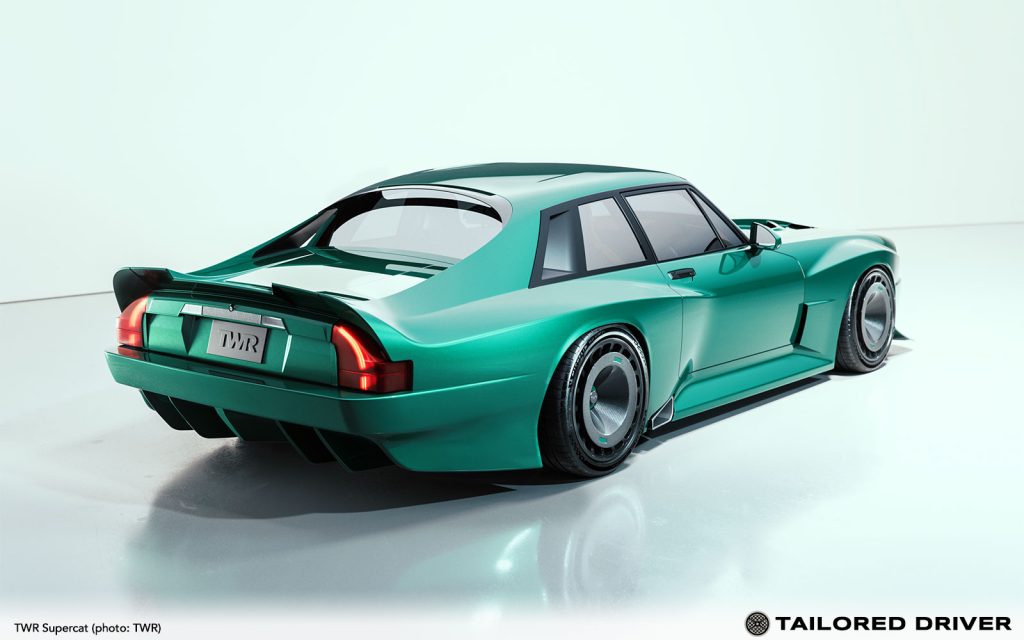

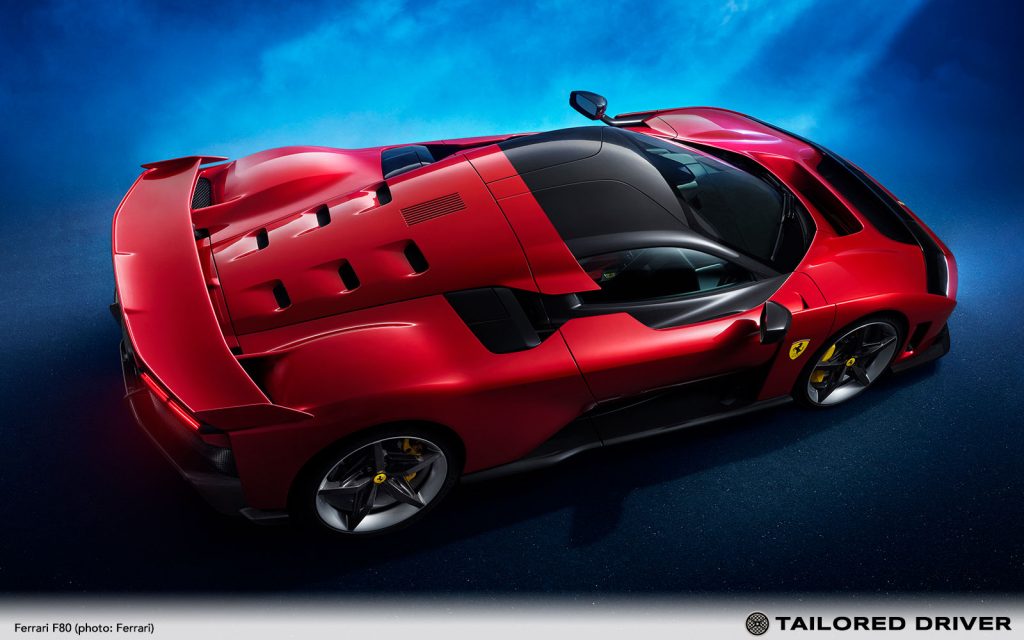
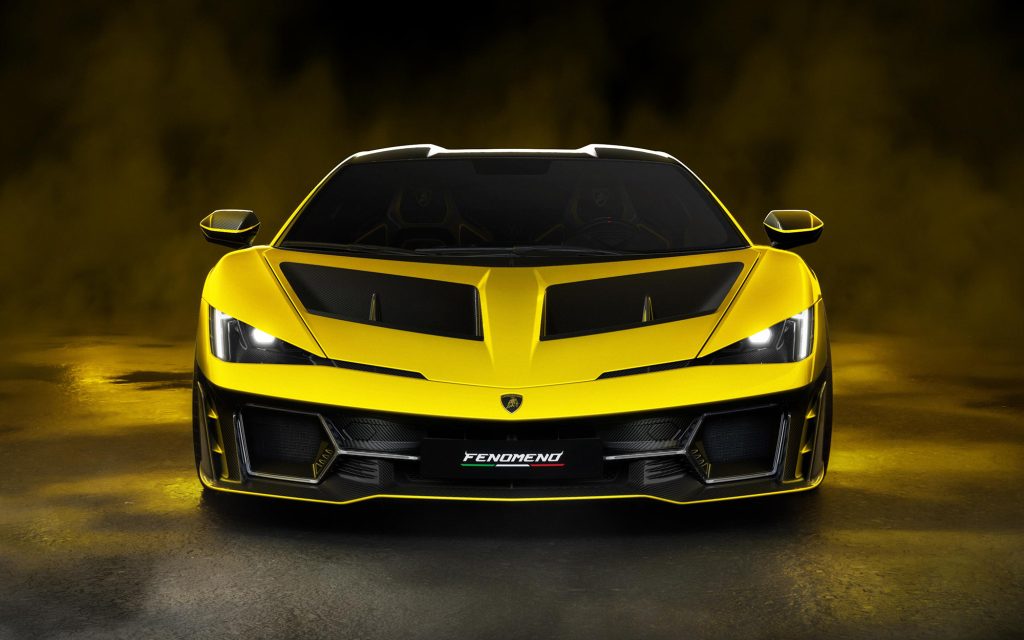
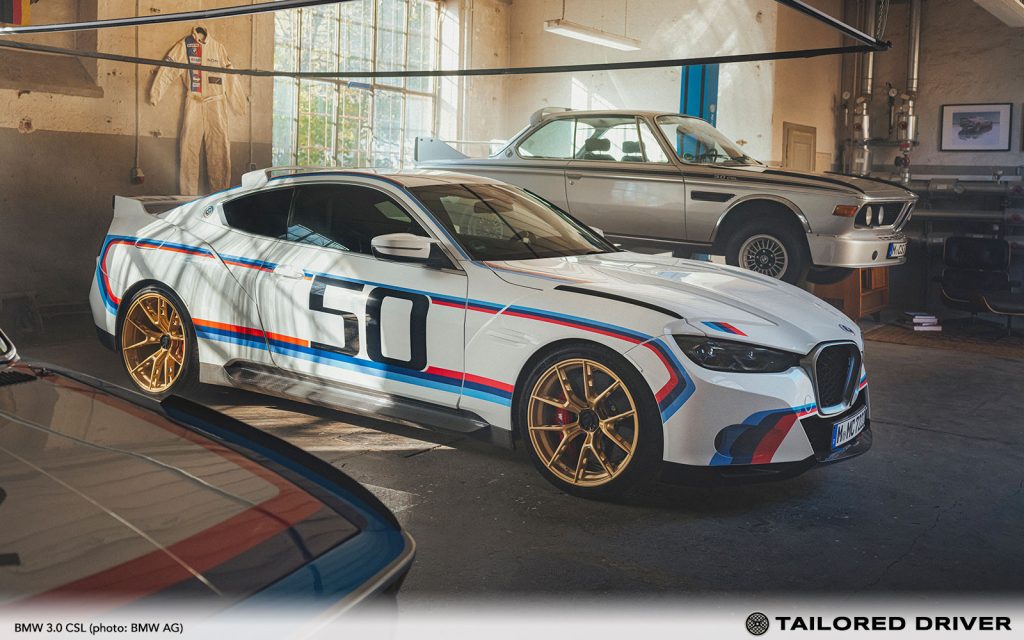
Responses